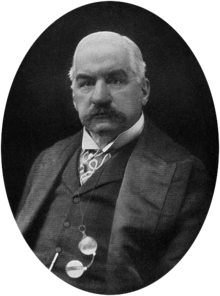JP Morgan
| J. P. Morgan | |
|---|---|
 |
|
| Born |
John Pierpont Morgan April 17, 1837 Hartford, Connecticut, U.S. |
| Died | March 31, 1913 (aged 75) Rome, Italy |
| Resting place | Cedar Hill Cemetery, Hartford, Connecticut, U.S. |
| Education | English High School of Boston |
| Alma mater | University of Göttingen (B.A.) |
| Occupation | Financier, banker, art collector |
| Spouse(s) |
Amelia Sturges (m. 1861; d. 1862) Frances Louise Tracy (m. 1865) |
| Children | Louisa Pierpont Morgan John Pierpont Morgan, Jr. Juliet Morgan Anne Morgan |
| Parent(s) |
Junius Spencer Morgan Juliet Pierpont |
| Signature | |
John Pierpont "J. P." Morgan (April 17, 1837 – March 31, 1913) was an American financier and banker who dominated corporate finance and industrial consolidation in late 19th and early 20th Century United States.
In 1892, Morgan arranged the merger of Edison General Electric and Thomson-Houston Electric Company to form General Electric. He was instrumental in the creation of the United States Steel Corporation, International Harvester and AT&T. At the height of Morgan's career during the early 1900s, he and his partners had financial investments in many large corporations and had significant influence over the nation's high finance and United States Congress members. He directed the banking coalition that stopped the Panic of 1907. He was the leading financier of the Progressive Era, and his dedication to efficiency and modernization helped transform American business. Morgan has been described as America’s greatest banker.
Morgan died in Rome, Italy, in his sleep in 1913 at the age of 75, leaving his fortune and business to his son, John Pierpont Morgan, Jr. His fortune was estimated at "only" US$80 million, prompting John D. Rockefeller to say: "and to think, he wasn't even a rich man".
Morgan was born into the influential Morgan family in Hartford, Connecticut, and was raised there. He was the son of Junius Spencer Morgan (1813–1890) and Juliet Pierpont (1816–1884). Pierpont, as he preferred to be known, had a varied education due in part to the plans of his father. In the fall of 1848, Pierpont transferred to the Hartford Public School and then to the Episcopal Academy in Cheshire, Connecticut (now called Cheshire Academy), boarding with the principal. In September 1851, Morgan passed the entrance exam for The English High School of Boston, a school specializing in mathematics to prepare young men for careers in commerce. In the spring of 1852, an illness struck which was to become more common as his life progressed. Rheumatic fever left him in so much pain that he could not walk, and Junius sent him to the Azores to recover.
...
Wikipedia
